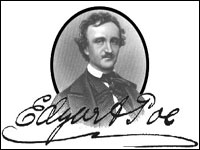Edgar Allan Poe National Historic Site [PA]
The Edgar Allan Poe National Historic Site preserves one of author Edgar Allan Poe's homes. The site presents information on Poe and his historical context and the influence of Poe's writings on other authors, including today's masters of horror in film and literature. Poe (1809-1849) is credited with creating the detective fiction genre, as well as being an early writer of American short stories. He is classified as a Romantic author; and his poetry, short stories, and novels lean toward the macabre. Famous works include "The Raven," "The Black Cat," "The Masque of the Red Death," "The Murders in the Rue Morgue," "The Tell-Tale Heart," and "Annabel Lee."
The site offers an 8-minute biographical audio-visual presentation, exhibits, period rooms, self-guided tours, guided tours, audio samples of famous actors narrating Poe and Poe's work set to music, and Junior Ranger activities. Reservations are required for all school groups. The website offers a teacher's handbook and additional educator resources.

